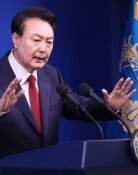North Korea to Abandon Nuclear Programs and Return to NPT
North Korea to Abandon Nuclear Programs and Return to NPT
Posted September. 20, 2005 06:42,
Six nationsthe two Koreas, the United States, Japan, China, and Russiaissued a joint statement yesterday that included North Koreas dismantlement of its nuclear programs and compensation measures for its concessions such as the normalization of relations between North Korea and the United Sates.
This achievement, as a result, has furnished a key to the solution of North Koreas nuclear issue, which has been regarded as the most dangerous element that threats the stability of the Korean peninsula.
The six nations also agreed to continue talks to produce further practical measures for the execution of this statement on the basis of the contents of the joint statement, and initiate a special forum for peace on the Korean peninsula.
The six nations held a plenary session at a reception hall in Beijing at about 12:00 p.m. (local time) yesterday, the seventh day of the fourth round of the six-party talks, and closed the meeting after issuing the joint statement that included six clauses
In the joint statement, the six nations agreed that North Korea shall abandon its current nuclear ambitions and dismantle its nuclear weapon programs, return to the Nuclear Non-Proliferation Treaty (NPT) and accept the inspections of the International Atomic Energy Agency (IAEA) as soon as possible.
The United States, meanwhile, made it clear that the U.S. has no intention to attack North Korea either with nuclear weapons or conventional weapons, and confirmed that there are no nuclear weapons on the Korean peninsular. South Korea also reconfirmed its previous position on the embargo of nuclear weapons that was settled in the declaration of denuclearization in the Korea peninsula, signed in 1992.
North Korea and the Untied States agreed to work together for the normalization of relations between the two nations, to respect the sovereignty of the other, and to pursue peaceful coexistence.
For the normalization of North Korea-Japan relations, the two nations also agreed to focus on current issues, rather than sticking to past unpleasant memories, in accordance with the Pyongyang declaration issued in September 17, 2002.
In regard to compensation measures for North Koreas concessions, the six nations agreed to enhance economic cooperation with North Korea, either multilateral or bilateral, through energy aid, economic investment, and trades.
Five nations, including the United States, expressed their intention to provide energy aid to North Korea. South Koreas suggestion of supplying two million kW of electric power to North Korea (made on July 12) was also included in the joint statement.
Wu Dawei (Vice Minister of Foreign Affairs in Charge of Affairs of Asia in Chain), chairman of the six-way talks and Chinas chief of negotiator, said at a plenary session, This joint statement is the most significant achievement that we have made in two years since the start of the six-party talks.
Song Min-soon, South Koreas Deputy Foreign Minister and chief negotiator for the six-party talks, said at a news conference, Leaving behind the Cold War structure, we have finally taken the first step toward true peace on the Korean peninsula, adding, In particular, North Korea made a very critical decision by promising to abandon its nuclear ambitions and dismantle its nuclear weapon programs for the first time since it began taking part in the non-proliferation nuclear talks.
The six nations will continue talks in order to devise practical measures for the execution of this joint statement. The fifth round of the six-party talks is scheduled to begin in early November of this year in Beijing.
Jong-Koo Yoon jkmas@donga.com
Headline News
- Korean president faces debate limitations unlike U.S. counterpart
- KEPCO's first quarter profits failed to meet market expectations
- Teenagers are left out of discussions about national pension
- 2 consultative bodies submit minutes regarding increasing number of medical students
- Woo Sang-hyuk's rivalry and friendship transcend borders







